Your Guide to Construction, Renovation, and Zoning Laws in Florida
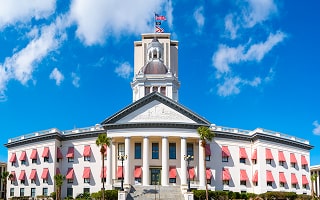
Florida is the retirement capital of the U.S., with good reason. Many people invest in Florida real estate. According to Attom, Florida has 8,306,505 residential properties and 365,267 commercial properties. However, Florida heavily regulates construction and renovations at the state and local levels. Before diving into the Florida property market, learn all you can about the laws and how they may affect you.
Property-related laws fall into two general categories: state-level and local (town/city/county/municipality). Each state divides property law responsibilities between these two entities; some laws fall to the state and others to local government. Under each main category, there are many different rules and regulations to review.
State Level (Regulations & Codes)

The Florida Building Commission within the Department of Business and Professional Regulation (DBPR) oversees all state building codes. This 27-member group is responsible for developing, maintaining, and interpreting the Florida Building Code. The Governor appoints each member, and they are a diverse group of architects, engineers, contractors, building owners, insurance, public education, local governments, building and fire officials, and persons with disabilities. Another governmental body called the Building Code Administrators and Inspection Board (BCAIB) is a section under the DBPR. It licenses and regulates building code administrators, inspectors, and plan examiners.
Although the state of Florida established the Florida Building Code, local governments are tasked with enforcing these codes in their jurisdiction through permits and inspections. The Florida Building Code is based on national codes (the International Building Code (IBC) and the International Residential Code (IRC)) and amended as necessary to fit the state's needs.
In addition to the Florida Building Commission, the DBPR, and the BCAIB, other state agencies may also be involved in establishing and enforcing building codes and related regulations.
Some of Florida's building codes include the following:
-
2023 Florida Building Code: Test Protocols for High Velocity Hurricane Zone
-
2023 Florida Building Code: Residential
-
2023 Florida Building Code: Mechanical
-
2023 Florida Building Code: Fuel Gas
-
2023 Florida Building Code: Building
-
2023 Florida Building Code: Accessibility
-
2023 Florida Building Code: Energy Conservation
-
2023 Florida Building Code: Plumbing
-
2023 Florida Building Code: Existing Building
Using this link, you can drill down and learn more about each code.
Construction
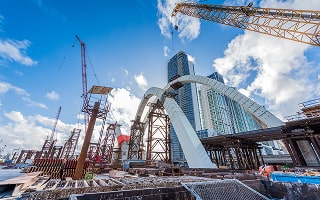
Florida construction laws were designed to regulate contractor licensing, contracts, liens, and dispute resolutions. They were enacted to protect all parties' rights and enforce responsibility, including owners, contractors, subcontractors, and material suppliers. Anyone involved in building new construction should be aware of these laws for compliance. Along with compliance with the Florida Building Code, some of the key construction laws in Florida include:
-
Construction Lien Law (Chapter 713, Florida Statutes): If contractors, suppliers, and subcontractors work on a property in Florida and are not paid for their work or materials, they can file a lien against the property. The lien secures payment and can lead to foreclosure if not resolved quickly.
-
Contractor Licensing: Florida requires all types of contractors (general, plumbers, electricians, HVAC professionals) to be licensed. The Florida Construction Industry Licensing Board (CILB) is a division of the Florida Department of Business and Professional Regulation (DBPR) that handles licensing of contracting professionals.
-
Construction Contracts: Florida construction contracts must be clear and concise and include all the specific details about the scope of work, payment terms, change orders, and dispute resolution processes. It is always a good idea to have them reviewed by an attorney before signing.
-
Florida's Construction Defect Law: Chapter 558 of the Florida Statutes requires property owners to provide written notice of defects to contractors and designers before filing a lawsuit. They must also give them ample opportunity to fix the problems.
-
Bonding: Some construction projects require payment and performance bonds, which are most often used in public projects to protect against nonpayment and project completion issues.
-
Dispute Resolution: Florida allows mediation, arbitration, and litigation for dispute resolution in construction projects.
-
Statute of Limitations and Repose: There are time limits for filing a construction defect claim. Typically, the owner has four years for defects, and a statute of repose (a more extended period to file) can be as long as 10 years.
-
Public Projects: Florida has specific laws and regulations governing public construction projects, including bidding procedures and bond requirements.
-
Choice of Law: Florida law allows parties to choose which state's laws will govern their contract, but Florida law may still apply in certain circumstances, especially regarding construction liens.
Commercial Structures
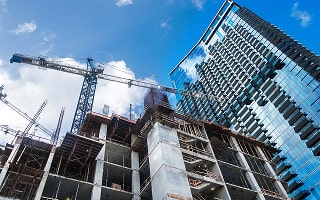
All commercial building projects in Florida must comply with the Florida Building Code (FBC). Many of these codes provide minimum standards for materials and processes used to ensure stability and the safety of people using the buildings. Complying with these rules also helps to avoid any litigation problems later.
Due to Florida's climate and proximity to the ocean, the state is prone to tropical storms and hurricanes. Construction laws are designed to protect against any damage during storms by fortifying structures using special materials and specific building processes.
Residential Structures
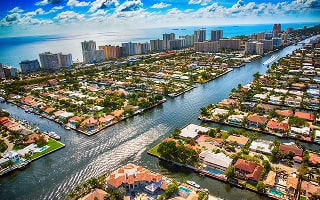
Florida's residential building code sets minimum standards so that all residential buildings support all loads, including dead loads, live loads, roof loads, flood loads, and extreme wind loads. Some examples of residential building codes in Florida include:
- R304.1: Habitable rooms must have a floor area of no less than 70 square feet.
- R304.2: Habitable rooms must not be less than 7 feet (horizontally).
- R305.1: Habitable rooms shall have a ceiling height of not less than 7 feet.
- R306.1: All dwellings must have a water closet, lavatory, and bathtub or shower.
- R310.1: All basements, attics, and every sleeping room must have at least one means of emergency escape.
Safety Standards

Safety and structural integrity are the main goals of Florida's building codes. They outline specific methods and materials contractors must use to ensure the safety of all people using the structures. Some of the highlights of these laws cover things like:
- Performance-Based Code: Allows contractors some flexibility with the materials and supplies they use to do the job.
- Structural Integrity: These rules ensure buildings can withstand specific loads and stresses, such as storms.
- Means of Egress: These rules provide safe and easy pathways for occupants to exit buildings safely in an emergency.
- Fire Safety: These laws address fire prevention, detection (smoke alarms), and suppression (sprinkler systems).
- Hurricane Protection: Specific laws regarding wind resistance and storm protection.
- Inspections: Regular inspections are required for public buildings like apartments to ensure ongoing compliance with Florida's building codes.
- Building Maintenance: These laws require proper maintenance of buildings and service systems to keep everyone safe and things operational.
- Product Approval: The Florida Building Commission oversees a product approval system to ensure safe and compliant building products are used.
- Milestone Inspections: Buildings three stories or higher require specific inspections based on age and proximity to the coast.
Building Codes

Florida has many different building codes split into categories such as residential, mechanical, plumbing, and existing buildings. You can review each section using this link. There are hundreds of pages with many details.
Asbestos Laws

Florida asbestos laws are administered jointly by the Florida Department of Environmental Protection (DEP) and the Department of Business and Professional Regulation (DBPR). The DEP handles notification requirements for asbestos removal during demolition and renovation projects, while the DBPR regulates the licensing of contractors and consultants involved in asbestos work.
Florida follows the federal Asbestos NESHAP (National Emission Standards for Hazardous Air Pollutants) regulations, which govern asbestos removal during facility demolition and renovation.
The NESHAP regulations apply to facilities with specific amounts of regulated asbestos-containing materials (RACM) on pipes, other components, or where RACM was previously removed.
The Florida DEP requires a Notice of Renovation or Demolition to be submitted to the DEP at least 10 working days before starting any project involving regulated asbestos.
The DBPR licenses asbestos contractors and consultants and requires proper training and certification for individuals working with asbestos.
Asbestos-containing materials must be disposed of at landfills, which are permitted to accept them. Different types of asbestos-containing materials (e.g., roofing, flooring) may require specific handling and removal. Employers must also comply with OSHA standards for asbestos exposure, including permissible exposure limits and worker protection measures.
Some counties, like Broward, may have additional regulations beyond the state and federal requirements.
Failure to comply with asbestos regulations can result in penalties, including fines.
Contractor Licensing Laws

Contractor licensing in Florida is mandatory. To ensure safety and compliance, contractors must be properly licensed by the Florida Department of Business and Professional Regulation (DBPR). This includes demonstrating financial stability, passing relevant exams, and obtaining necessary insurance. A background check and fingerprint scan are also part of the licensing process.
There are two main types of licenses: certified (statewide) and registered (local). Certified contractors can work anywhere in the state, but registered contractors are limited to specific jurisdictions.
Some of the requirements for a license include age (18+), financial stability (demonstrated by a credit score of 660 or higher, or a surety bond), passing a state construction exam, providing proof of insurance (liability and workers' compensation), and submitting an application with fees. Contractors can also obtain licenses for specific trades like plumbing, electrical, HVAC, etc. General contractors typically need four years of experience, including at least one year in a supervisory role.
Some specialty contractors are now subject to voluntary licensure, meaning that although it's not required, they gain benefits and recognition by applying for a license.
Contractor businesses must register with the Florida Department of State.
Insurance & Bonds
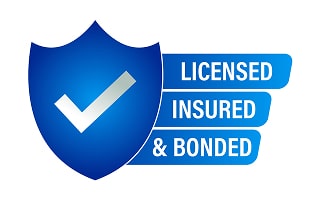
Depending on the license type and business structure, Florida requires contractors to maintain specific insurance coverages and potentially obtain surety bonds. General liability insurance is a common requirement, with minimum coverage amounts often set at $100,000 per person and $300,000 per occurrence for public liability, and $50,000 to $500,000 for property damage.
Any contractor or contracting business with employees must also carry workers' compensation insurance.
Surety bonds, like the Financial Responsibility Officer (FRO) bond, are also required for those managing a construction business's finances. A $100,000 FRO bond is needed for the individual designated as the financially responsible officer for a construction business, ensuring they can manage the company's finances and meet obligations. Depending on the contractor's credit score and the type of work, a surety bond may be necessary. For instance, a contractor with a FICO score below 660 may need a surety bond. Depending on the project and local regulations, contractors might also need bid, performance, or payment bonds.
Public Works Contracts/Public Bidding

In Florida, public works projects are awarded through a competitive bidding process governed by the Florida Statutes, found in Chapter 255.
Chapter 287 of the Florida Statutes, specifically 287.057, also significantly governs the procurement of commodities and contractual services, including those related to public works.
Some of the highlights of the public works regulations are:
The chapter on Public Property and Public Works outlines the general framework for public property and public works projects, including acquiring, constructing, and maintaining public facilities.
The section on Competitive Bidding emphasizes the importance of competitive bidding for public works contracts, ensuring transparency and fairness in the procurement process. The chapter also provides specific guidelines on bid procedures, such as advertising requirements, bid submission deadlines, and bid evaluation criteria.
Some public works projects may be subject to prevailing wage requirements, which are also addressed within the statutes stating that all employees working on a project must be paid at least the prevailing minimum wage.
Renovations
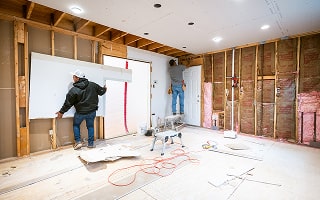
In Florida, most structural renovations, electrical work, plumbing upgrades, and major installations (like HVAC systems) require permits. Contracts for home improvement work over $500 must be in writing. It is crucial to ensure contractors obtain necessary permits and have a clear, detailed contract.
Some other highlights of the renovation laws in Florida include:
- Permits: Any renovation that involves altering, repairing, or installing structural, electrical, mechanical, or plumbing systems requires a permit.
- Contracts: Home improvement projects that exceed $500 must be in writing and include details about the project, payment schedule, and timelines.
- Contractor Licensing: Renovation contractors need to be licensed in Florida.
- Construction Liens: If contractors, subcontractors, or suppliers work for a property owner and do not get paid, Florida law allows them to file a lien against the property.
- Building Codes: Contractors must adhere to Florida's construction building codes to ensure safety, durability, and energy efficiency.
- Non-Compliance: Failure to get the necessary permits or comply with building codes may result in fines, stop-work orders, or other penalties.
- Homeowner Protection: Florida law also protects homeowners by requiring contractors to provide written contracts. Florida has set up the Florida Homeowners' Construction Recovery Fund, which helps homeowners in the case of contractor misconduct.
Some examples of projects that require a permit are:
- Altering or replacing plumbing fixtures.
- Altering or replacing electrical wiring.
- Adding a pool or deck.
- Changing the structure of your home.
- Installing or replacing HVAC units.
- Replacing drywall.
Some examples of projects that may not require a permit are:
- Simple cosmetic changes, like painting or wallpaper.
- Replacing a faucet or water closet.
- Repairing siding under 20 square feet.
Environmental Laws

Florida has extensive environmental laws regarding construction and renovations. To comply, contractors must obtain specific permits, implement erosion control measures, and demonstrate an understanding of potential environmental impacts to comply with state regulations.
The Florida Department of Environmental Protection (FDEP) is the primary agency responsible for enforcing environmental laws in Florida and protecting natural resources. They work with Water Management Districts to regulate construction activities that could affect the environment.
Some of the environmental laws that pertain to construction in Florida include:
- Wetlands: Any construction project that may potentially impact the wetlands must be approved by the Florida Department of Environmental Protection (DEP), and contractors must obtain the required permits before beginning work.
- Coastal Construction Control Line (CCCL): Chapter 62B-33 of the Florida Administrative Code (FAC) includes regulations addressing the design, siting, and potential impacts on the beach dune system and any coastal construction projects.
- Sea Level Rise and Flooding: Florida also has rules regarding state-financed construction projects to assess and address the impacts of rising sea levels and flooding. These are included in Section 161.551 of the Florida Statutes.
- Permitting: The Department of Environmental Protection (DEP) issues permits for various facilities and activities such as dredge and fill operations, which can affect wetlands and waterways, and those related to air and water quality, wetlands, and coastal construction.
- Green Building: Florida Building Code mandates energy and water efficiency standards, and the LEED certification program encourages sustainable building practices.
- Solid Waste Management: Solid waste management facilities require permits and must adhere to specific regulations, especially those related to landfill construction.
- Environmental Due Diligence: Developers must conduct thorough environmental assessments to identify and mitigate any potential risks associated with construction projects.
- Soil Erosion and Sedimentation: Construction activities can lead to soil erosion and sedimentation, impacting waterways. Regulations address these concerns to minimize environmental damage.
- Environmental Resource Permits (ERPs): The FDEP and Water Management Districts issue ERPs for construction activities that could impact wetlands, surface water flows, or water quality.
- Water Management Districts: These districts oversee water resources and issue ERPs for construction projects that could impact water quality or quantity.
- Materials Management: Construction projects must comply with regulations regarding materials like lead paint and asbestos-containing materials to avoid health hazards.
Solar Regulations
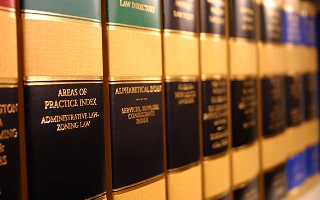
Florida's solar regulations focus on safety and facilitating future installations with new construction or renovations. They include details about rooftop area, building design, and contractor licensing. Some of the more interesting solar regulations include:
-
Solar-Ready Zones: New roofs must have portions designated "Solar-Ready Zones" to simplify future solar panel installation. Additionally, a minimum area of 100 sq. ft. per kW should be reserved for solar collectors, free from obstructions.
-
Building Design: When architects or builders design new homes and commercial buildings, they must be oriented to maximize sunlight exposure and minimize shade on the roof, ideally with a north-south orientation to make future solar installations successful.
-
Contractor Licensing: Florida requires all solar contractors who install, alter, repair, maintain, relocate, or replace solar thermal or PV systems to be state-certified (licensed).
-
Florida Building Codes: The Florida Building Code includes specific mechanical and roofing requirements for solar energy systems, including those integrated into the roof (BIPV).
-
Roofing: Solar contractors can perform roofing work directly related to solar system installation, including cutting openings, installing flashings, and attaching equipment, within a defined area around penetrations.
-
Electrical Work: Electrical contractors are also qualified to perform solar PV installations due to the electrical component of the work.
-
Permits: New solar system installations in Florida generally require a permit. Check with the local building department for specific rules in your area.
-
Florida Solar Rights Act: This act protects the right to install solar energy systems and prevents homeowner associations or other entities from unreasonably restricting their installation.
-
Solar Standards: The Florida Solar Energy Center® develops and promotes standards for solar energy systems, ensuring quality and performance.
-
Shading: Landscapers must balance shade trees around the property to minimize shading on the solar collector areas.
-
Loads: The structural design of any new roof must consider the weight of solar panels, and the contractor must include this in the construction documents submitted for permits.
Gas/Oil

Florida has a few laws regarding gas and oil heating appliances in new construction or renovations. These regulations focus on safety and energy efficiency. Some specific rules address installation, venting, and fuel storage. The Florida Building Code includes Fuel Gas and Mechanical codes, which govern the installation of HVAC systems and ensure proper clearances, venting, and fuel supply. Florida requires a permit to install or modify any new gas or oil heating system.
Some of the highlights of these laws include:
-
Listing and Labeling: All gas and oil appliances must be listed and labeled for the specific application or approved through an engineering evaluation.
-
Manufacturer's Instructions: Contractors must follow the manufacturer's instructions when installing a specific appliance.
-
Energy Efficiency: The Florida Energy Efficiency Code for Building Construction sets the minimum standards for energy efficiency in heating systems.
Specific Requirements for Gas Heating
- Fuel Gas Piping: Fuel gas piping systems must comply with the Florida Building Code, Fuel Gas section.
- Gas Demand: The gas piping must be sized to meet all appliances' total connected hourly load, assuming they could operate simultaneously at full capacity.
- Combustible Air: Adequate combustion air must be provided for gas appliances.
- Venting: Vented gas appliances must be appropriately vented to the outside, with specific vent termination and clearance requirements.
- Prohibited Locations: Unless specific conditions are met, gas appliances are generally prohibited in sleeping rooms, bathrooms, and storage closets.
Specific Requirements for Oil Heating
- Fuel Oil Piping and Storage: Fuel oil piping and storage must comply with the Florida Mechanical Code.
- Vent Termination: Liquid fuel vent pipes must terminate outside the building, with specific clearances from openings and above grade to prevent obstruction.
- Vent Caps: Vent caps must have a minimum free open area equal to the cross-sectional area of the vent pipe.
- Tank Requirements: Tanks containing heaters must be designed for the maximum static head imposed, especially if vent pipes are filled with oil.
- Oil-Fired Water Heaters: Oil-fired water heaters must comply with the Florida Building Code, Mechanical section.
Electricity

Florida construction laws regarding electricity are primarily governed by the Florida Building Code, which adopts the National Electrical Code (NEC). Specifically, the 2008 NEC is the adopted standard, although a 2014 version has been published. These codes regulate the design and construction of buildings, focusing on effective energy use and ensuring safety through electrical systems.
Some key aspects of Florida's electrical construction laws include:
-
Licensing: State laws require that all electrical contractors be licensed.
-
Permits: Typically, permits are required for all types of electrical wiring, rewiring, adding new circuits, or modifying existing ones during renovations.
-
GFCI Protection: The NEC 210.8 mandates Ground Fault Circuit Interrupter (GFCI) protection in specific locations to prevent electrical surges and dangerous current flow, particularly in areas prone to moisture or contact with water, such as bathrooms and kitchens.
-
Safe Working Space: The NEC also dictates specific clearance requirements around electrical panels to ensure safe access for maintenance and repairs.
-
Low-Voltage Work: Companies certified under Chapter 364 (telecommunications) are exempt from specific local ordinances regarding permits for low-voltage electrical work.
-
Subcontracting: General contractors must subcontract certain trades, including electrical work, unless they are also certified or registered for that specific trade.
-
Temporary Underground Power Panels: Florida has specific regulations regarding the use of temporary underground power panels for construction.
-
Solar Panel Installation: Owners must utilize licensed electrical contractors to wire solar panels, including their interconnection with existing electrical systems.
-
Emergency and Standby Power: Florida regulations address the design and duration of emergency and standby power systems.
The Florida Building Code provides a statewide framework for electrical work in construction, but local governments may also have additional rules and even stricter requirements.
Government Housing Programs
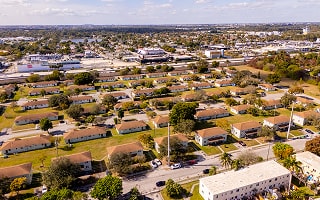
Florida offers several government housing programs to help residents find affordable housing, including down payment assistance, rental assistance, and programs for low-income individuals and families. These programs are administered by various state and local agencies, such as the Florida Housing Finance Corporation and local housing authorities.
Some of the programs Florida offers to low-income residents include:
- Florida Hometown Heroes Program: This program provides down payment and closing cost assistance to eligible first-time homebuyers, including veterans and active-duty military personnel.
- SHIP (State Housing Initiatives Partnership) Program: A state program that provides funds to local governments to create and preserve affordable housing. SHIP funds can be used for various purposes, including down payment assistance, rehabilitation, and new construction.
- Housing Choice Voucher Program (formerly Section 8): This Program, administered by local public housing agencies, provides rental assistance to low-income families, older adults, and individuals with disabilities.
- Community Development Block Grant (CDBG) Program: A federal program that funds housing and community development projects that benefit low-income households.
- Emergency Rental Assistance Programs: This includes various programs, such as the one funded by the American Rescue Plan Act (ERA2), that offer financial assistance to eligible households to help with rent, utilities, and other housing-related costs.
- Live Local Act: A comprehensive, statewide initiative focused on increasing the availability of affordable housing.
Property Tax Credits and Incentives
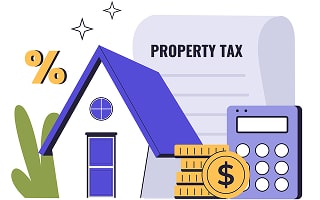
Florida's Department of Revenue offers many property tax credits and incentives to help alleviate the property tax burden for some residents. Another goal for these incentives is to encourage renovations and specific types of property use.
Some of the most common tax credits and incentives in Florida include:
-
Homestead Exemption: The Homestead Exemption is the most common property tax benefit for Florida residents who own and permanently reside in their homes. It reduces the taxable value of the property by $50,000. A valuable benefit associated with the homestead exemption is the Save Our Homes (SOH) cap. It limits the annual increase of the property's assessed value to 3% or the Consumer Price Index (CPI), whichever is less. Florida homeowners with a homestead exemption and an accumulated SOH cap may transfer a portion of their assessment difference (up to $500,000) to a new Florida homestead. To qualify, you must have legal or beneficial title to the property as of January 1st and make it your permanent residence.
-
Senior Exemption: Florida residents 65 and older may qualify for the senior exemption, offering them an additional $50,000 homestead exemption for non-school taxes. You must be eligible for the homestead exemption before applying for the senior one. You must also have a limited income to qualify and submit proof of your age and income.
-
Long-Term Resident Senior Exemption: Some counties and municipalities offer this additional exemption for low-income seniors who have lived in their home for at least 25 years and meet other criteria, including a market value less than $250,000.
-
Person(s) with Disabilities: A person with a disability may qualify for a $5,000 disability exemption. The disability must be total and permanent as certified by a Florida-licensed physician. Blind people may also get a $5,000 exemption. People with quadriplegia or those using a wheelchair for mobility due to paraplegia, hemiplegia, legal blindness, or other total and permanent disabilities may earn a total exemption (no tax due at all). This one is subject to income limits (except for people with quadriplegia). Totally and permanently disabled first responders (injured in the line of duty) may take advantage of a total exemption as well.
-
Veteran Exemption: Florida offers property tax benefits for honorably discharged veterans, including a $5,000 reduction for those with a 10% or more disability from wartime service and total exemptions for those with service-related total and permanent disabilities.
-
Widow or Widower: A $5,000 exemption is available for permanent residents who are widows or widowers and have not remarried.
-
Religious/Charitable Organization: Real estate owned and used by specific religious, charitable, or educational organizations may be exempt from property tax.
Applications for these exemptions must be filed by March 1st of each year. To qualify, you may have to verify your income or other statuses. Many of these are statewide, but some are local, and your specific area may offer even more assistance.
Green Building Incentives
Florida's Property Tax Abatement for Renewable Energy increases the value of residential property due to the installation of renewable energy equipment like solar panels and batteries, which are not taxed. This abatement is available until the end of 2037.
Solar energy systems and qualifying components are exempt from Florida's sales and use tax. Some cities and counties offer incentives for green building practices, such as the City of Orlando's Green Building Incentive Program, which provides tax rebates based on LEED certification levels.
Other Building Incentives
Governor DeSantis proposed a $1,000 homestead rebate to cover state-mandated school property taxes, which the Florida Legislature is considering.
The Live Local Program Tax Credit for contributions to the Florida Housing Finance Corporation supports affordable housing initiatives.
Local Level (Permits and Regulations)
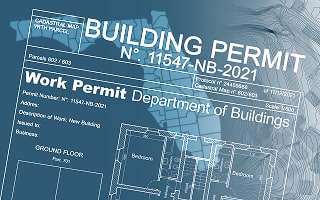
Many of Florida's building laws are established and enforced at the local level. Although Florida has a statewide building code based on international standards, the local government (cities and counties) can adopt stricter amendments requiring more stringent standards for work and materials. Local regulations generally revolve around enforcing building codes, which is done through building permits and inspections. Another aspect of local building regulations centers on zoning ordinances. Most new construction and renovations require a permit and inspections.
Building-Friendly Areas of Florida
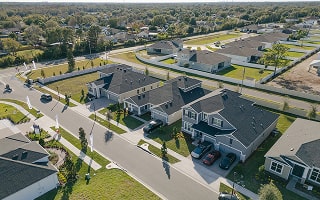
Some areas of Florida are easier to build based on less strict building codes and zoning laws. Some building-friendly areas include the suburbs of Jacksonville, Orlando, Tampa, and cities like Port St. Lucie and Melbourne.
Although Florida as a whole has some of the strictest building laws in the U.S., there are areas where the rules are a bit less strict. Florida's building codes are designed to protect lives and property from natural disasters, especially hurricanes. Certain buildings and structures are exempt from the Florida Building Code, including those regulated by the federal government (like some railroads) and those that fall under specific permit exemptions listed in Florida Statutes.
Charter counties like Miami-Dade have some degree of flexibility in adopting their own codes, but they must still comply with state law. While the overall code is strict, specific requirements can vary slightly between municipalities and counties.
Tiny homes may have specific regulations depending on the location and size. Zoning regulations also influence what can be built and where, which can vary by location.
Where to Obtain Florida Building Permits
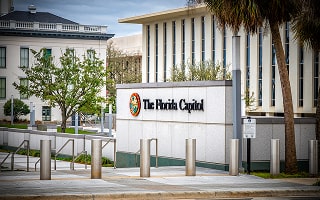
Since most things require a building permit, you need to know where to go and how to get one. You can apply for a building permit with the city or county building department (names vary). Many allow you to apply online, but sometimes, you may have to apply in person. Along with the permit application, you must pay the fee and supply documentation like blueprints, building material lists, contractor licenses, and more. The process looks like this:
- Find the correct building department in your jurisdiction.
- Visit the website and find the application form.
- Complete it online or mail it with your fee and support documentation.
- Wait while they review and approve your permit.
- Once you have the permit, you will have to schedule some inspections, and you can begin work.
Some links to other building departments in Florida include:
- Broward County Building Permits
- City of Miami Building Department
- City of Port St. Lucie Building Department
- Melbourne Building Permits
- Miami-Dade County Building Department
- Miami Beach Building Department
- Naples Building Department
- Orange County Building Division
- Orlando Permitting Services Division
- Palm Beach County Building Division
- Polk County Building Division
The building inspector must review the work being performed during the permitting process. They may do this before, during, and after the project to ensure the work complies with all local building codes to keep people safe. Depending on the city or county's rules, you may schedule your inspections through the online portal, by phone, or by email.
Zoning Laws
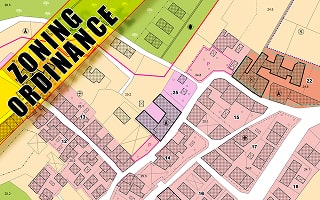
Florida zoning laws are rules about how land can be used within specific areas and what type of buildings can be built. They also dictate where on the property a building can be placed. Zoning laws are enacted and enforced by local cities and counties.
Some of the zoning designations used for land throughout Florida include:
-
Land Use: These laws define the purpose of a specific piece of land and what type of buildings it can hold. Some examples are residential, commercial, or industrial.
-
Building Restrictions: These rules specify building heights, setbacks (minimum distances from property lines), and lot coverage (how much of the lot can be covered by buildings). For example, residential areas may have lower building heights than commercial or industrial areas.
-
Parking Requirements: Zoning often includes regulations about the number of parking spaces needed for specific land use types. For example, a commercial property may be limited in terms of the number of parking spaces it must have.
-
Signage: Zoning laws regulate signs' size and placement, especially in commercial zones.
-
Density Restrictions: Zoning can control the number of buildings or dwelling units per acre in a given area.
-
Variances and Rezoning: Property owners can sometimes request changes to zoning regulations, such as variances (exceptions to the rules) or rezoning (changing the overall zoning classification).
-
Local Variances: Zoning laws are not uniform across Florida; each city and county can tailor their regulations to meet local needs and preferences.
Zoning impacts an area considerably, including property values, construction (including building size, height, and materials), and community planning. Some specific types of zones include:
-
Residential Zoning: Residential zones are designated for residential use. That includes single-family homes, multi-family dwellings, and mobile home park zoning in Florida.
-
Commercial Zoning: Commercial zones are designated for commercial use, meaning they can contain businesses, office buildings, and other commercial buildings.
-
Industrial Zoning: Industrial zones are reserved for manufacturing plants. Classifications within industrial zones include light industrial, heavy industrial, and industrial planned development (for later use).
-
Agricultural Zoning: Agricultural zoning designates areas used for farming. It may include variations like agricultural, agricultural residential, and agricultural planned development.
-
Mixed-Use Zoning: Mixed-use zoning is designated for multiple types in the same area. That may mean apartment buildings in the same area as commercial retail properties. Some of the classifications here are commercial-residential, industrial-commercial, and industrial-residential.
-
Special Zoning: Special zoning areas are those that the state has earmarked for special uses such as environmental protection, historical preservation, military base reuse, or special public projects.
Related Links and Enforcement Offices
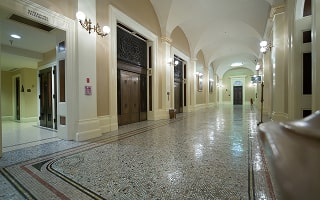
When it comes to Florida construction, renovation, building, and housing regulations, many government departments and agencies standardize, regulate, and enforce building rules. Some overlap with their duties, but most in Florida are on the local level. The state agencies tend to set broad minimum standards, and then the cities, towns, and counties customize and adopt from there.
The links below provide detailed information on the state's construction, zoning, renovating, and housing rules.
Other Helpful Links
- Florida Building Commission
- Florida Department of Business and Professional Regulation (DBPR)
- Building Code Administrators and Inspection Board (BCAIB)
- Florida Construction Industry Licensing Board (CILB)
- Florida Building Code
- Florida Housing Finance Corporation
- Florida Department of Environmental Protection (DEP)
- Federal Asbestos National Emissions Standards for Hazardous Air Pollutants (NESHAP)
- Florida Administrative Code (FAC)
- LEED Certification Program
- Florida Solar Energy Center
- Florida Housing Finance Corporation
- Florida Department of Revenue